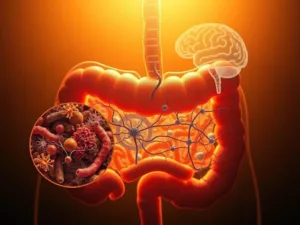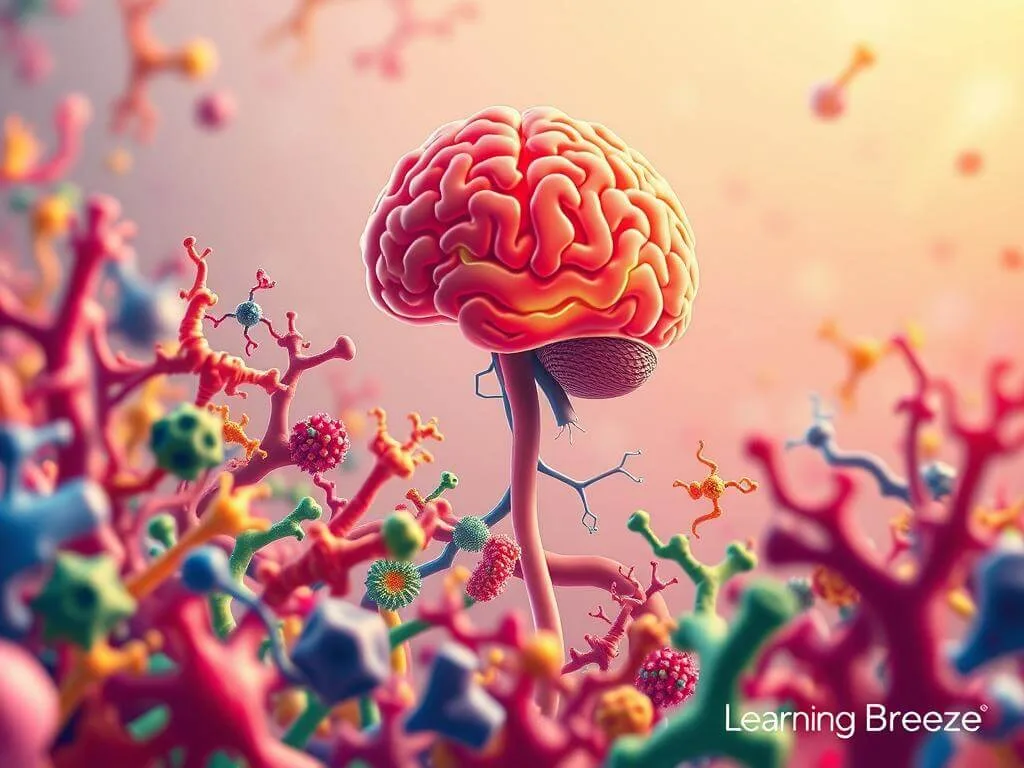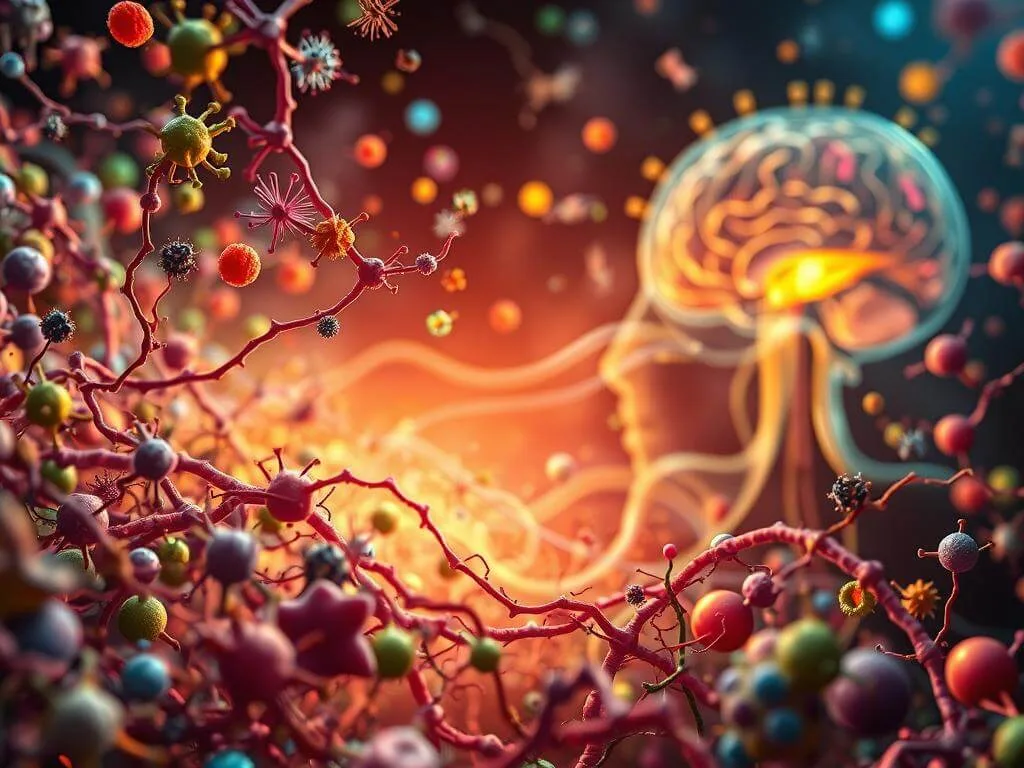Everyone would be surprised to learn that excellent mental health begins within their digestive system. My search led me to understand the gut-brain axis. A new groundbreaking scientific discovery verifies how the digestive microbiome directly affects our mental health.

What does science have to say about the relationship of tiny life forms in our bodies doing various things besides digesting our food? The gut-brain axis is a very interesting and complex phenomenon. Trillions of microbes and other microorganisms influence every aspect of our mood and thought processes as they connect to the brain.
Research on this subject has clearly stated how gut microbes affect our mental health. They are responsible for the rise in the moods and clear thinking of human beings. The gut-brain connection will likely provide yet-to-be-explored avenues in treating mental disorders.
Key Points
- Digestive microbes communicate through the gut-brain axis, which constitutes an intricate system connecting bacteria with brain functions.
- The neurotransmitters which gut microbes produce have essential roles in mental health functions.
- Many trillions of microorganisms have essential roles in brain emotional processing and cognitive activities
- The mental health benefits arise when people keep their microbiomes balanced
- Scientific investigation continuously proves the deep brain functional relationship with gut health status
Understanding the Gut Brain Axis and Its Impact on Mental Health
The link between our gut and the brain appears to be an emerging field of study. A complicated net has been discovered, which surpasses what we ever knew about our bodies, according to scientists.
Our mind and gut have an amazing connection. They are affiliated through a unique system known as the bidirectional gut-brain axis. This mode enables them to exchange multitudes of messages incessantly.
The Bidirectional Communication System
The gut-brain axis behaves similarly to a communication system through multiple transmission methods. This system contains multiple ways to send messages.
- Neurological pathways
- Immune system signals
- Hormonal messaging
- Metabolic interactions
Role of Microbiota in Neural Function
Gut microbes create neurotransmitters that influence neural brain activity. These small creatures create essential chemical processes which include:
| Neurotransmitter | Potential Brain Impact |
|---|---|
| Serotonin | Mood regulation |
| GABA | Stress reduction |
| Dopamine | Motivation and pleasure |
Chemical Signaling Between Gut and Brain
The gut-brain connection exists. It is brought about by molecular messengers that travel from the gut to the brain via the vagus nerve. Such signaling has an effect on the feelings and perceptions of individuals.
Understanding these associations will reveals how our intestines communicates with our minds. Simply put, it proves how wonderfully one’s digestive system could affect an individual’s mental health.
Scientific Mechanisms Behind the Gut-Brain Axis
Our gut and brain are always talking to each other, and this constant conversation happens through powerful chemical signals. To truly understand the Gut-Brain Axis, we have to take a closer look at these signals. They clearly show how a healthy and balanced gut microbiome that can lead to better mood stability and clearer thinking.
Short-Chain Fatty Acids (SCFAs) and Brain Inflammation

The good bacteria in our gut break down the fiber we eat and produce Short-Chain Fatty Acids (SCFAs). You can think of SCFAs, like Butyrate, Propionate, and Acetate, as tiny superheroes working behind the scenes. They don’t just strengthen our gut lining; their biggest role is actually protecting our brain.
Butyrate plays a key part in maintaining the Blood-Brain Barrier (BBB). This barrier works like a trained security guard around our brain’s blood vessels, making sure harmful substances don’t slip through. Butyrate keeps the barrier’s gates, called tight junctions—firm and sealed.
But when our gut falls into dysbiosis (meaning the bacterial balance gets disturbed), SCFA production slows down. As a result, those tight junctions start to loosen. This gives toxins from the gut, especially harmful bacterial fragments like Lipopolysaccharides (LPS), a chance to cross the now weak barrier. Once they sneak in, they trigger inflammation in the brain, known as neuroinflammation. This kind of inflammation often leads to constant tiredness, mood swings, and difficulty focusing.
Tryptophan Pathway and Serotonin Production
Tryptophan is an important amino acid, our body relies on as a building block. Our gut microbes work like traffic controllers, guiding where Tryptophan goes next. When things are running smoothly, Tryptophan moves toward producing Serotonin, the neurotransmitter that keeps us feeling happy, relaxed, and emotionally stable.
Surprisingly, our gut creates nearly 90% of our body’s Serotonin. The gut bacteria act like hardworking staff behind the scenes, helping with production and controlling how it’s released into our system.
But when our body is under stress or our gut becomes inflamed, Tryptophan can get pushed onto a harmful route called the Kynurenine pathway. On this path, it turns into compounds that fuel inflammation and may even damage our nerve cells.
A healthy and diverse gut microbiome keeps Tryptophan on the right track, guiding it toward Serotonin production and helping stabilize our mood naturally.
Gut Microbes and Neurotransmitter Creation (GABA, Dopamine)
Your gut microbes don’t just affect serotonin, they actually make several other key neurotransmitters too. Even though these microbes mostly produce those chemicals to communicate inside the gut, many of them still travel through the bloodstream or send signals to the brain through the Vagus Nerve.
GABA (Gamma-Aminobutyric Acid):
Consider GABA as your brain’s built-in calm button. It’s the main chemical that helps you relax and slow down stress signals. Strains like Lactobacillus and Bifidobacterium naturally produce GABA. When you nourish these bacteria, your gut actively supports your brain in reducing anxiety and encouraging deeper relaxation.
Dopamine:
Some microbes, especially certain Bacillus species, can produce dopamine, the chemical behind our motivation, reward response, and sense of pleasure.
When we feed our gut the right foods and keep our microbiome diverse, we literally give our brain the raw materials it needs to maintain emotional balance and a positive mood.
(If you’re curious and want to deeply understand how these molecules are transformed inside the body, The Gut-Brain Axis: A Comprehensive Guide to Biotransformation is a highly recommended resource that breaks it all down in detail.)
How Gut Microbes Influence Brain Chemistry and Mood

Medical studies provide evidence for how intestinal health directly affects mental processes. Gut microbes produce neurotransmitters that affect our mood together with our thoughts. Microbes significantly impact our mental condition because they directly influence our brain functions.
Nature operates within the digestive system similarly to how a chemical manufacturing plant operates. The mind finds control through neurotransmitters, which the body produces. The level of brain involvement through gut health becomes visible through this research.
Neurotransmitter Production by Gut Bacteria
Gut bacteria are quite unique, because they can synthesize neurotransmitters. They generate important chemical messengers for the brain. These small organisms communicate with the nervous system.
- The gut produces more than 90% of human body’s serotonin.
- Specific bacteria generate dopamine and GABA
- Neurotransmitter production impacts mood regulation
Impact on Serotonin and Dopamine Levels
The gut microbiome influences serotonin and dopamine levels; having enough good gut bacteria helps in to maintain neurotransmitter levels, thereby reducing the risk of mood disorders.
| Neurotransmitter | Gut Microbe Influence | Mental Health Impact |
|---|---|---|
| Serotonin | 90% Produced in Gut | Mood Stabilization |
| Dopamine | Bacterial Synthesis | Motivation Regulation |
Stress Response and Anxiety Regulation
The existence of a balanced gut microbiome demonstrates the ability to reduce mental stress and anxiety symptoms. The gut bacteria act as mediators between emotional responses and mental strength.
According to the research, a wholesome mix of gut bacteria can reduce depression and anxiety risks by approximately 40 percent. The evidence shows how health is connected to brain function.
Brain-to-Gut Feedback: How Stress and Emotions Change Microbiome
The flow of information in the Gut-Brain Axis is truly a two-way street. Your gut microbes constantly send signals to your brain, but your brain’s emotional state can also profoundly and rapidly change the environment inside your gut. This top-down effect is driven by your body’s powerful stress response system.
The HPA Axis: Your Stress Control Center
When you feel stressed, threatened, or anxious, your brain activates its central stress system: the Hypothalamic-Pituitary-Adrenal (HPA) axis. Consider this axis as the brain’s alarm system.
- The Hypothalamus (in the brain) recognizes stress.
- It signals the Pituitary gland.
- The Pituitary gland then signals the Adrenal glands (above the kidneys).
The result of this cascade is an immediate release of the body’s primary stress hormones, which prepare you for “fight or flight.”
Cortisol: The Hormone That Shakes the Gut
The HPA axis’s final output is the massive release of cortisol. Cortisol is a life-saving hormone in acute situations, but when stress becomes chronic, high levels of cortisol flood your entire system. This flood doesn’t just affect your mood; it acts as a direct, physical signal to your gut lining.
High, persistent levels of cortisol disrupt the delicate balance of the gut in two major ways:
- Microbial Imbalance: Cortisol favors the growth of harmful bacteria while suppressing the growth of beneficial strains (like those that produce soothing SCFAs). Your stress literally starves the good guys.
- Reduced Blood Flow: When you’re stressed, your body prioritizes sending blood to your muscles and brain, diverting it away from the digestive tract. This slowdown disrupts the natural rhythm of the gut, weakening its defenses.
Stress Increases Gut Permeability
The most damaging effect of chronic stress and high cortisol is on gut permeability. Just as Butyrate (from the gut) helps seal the Blood-Brain Barrier, cortisol (from the brain) actively works to loosen the tight junctions of the intestinal wall.
This stress-induced loosening of the gut wall is a major cause of the infamous “Leaky Gut.” When the barrier becomes permeable, it allows toxins and bacterial fragments to leak into the bloodstream. This leakage is what initiates the Neuroinflammation cycle we discussed previously. In short, chronic stress turns your emotional distress into physical damage, ensuring that your anxiety feeds a negative cycle of inflammation.
Dietary Strategies to Support Gut-Brain Health
You should initiate dietary changes first because they establish the fundamental support for the gut-brain axis. Plants form the base of an ideal diet that increases performance in your gut and brain simultaneously. Plenty of beneficial bacteria will grow through weekly consumption of thirty different plant types.
The intake of fermented products stands as the fundamental method to achieve proper digestion. Empty fermentation produces beneficial bacteria that exist in foods such as fermented items spanning from yogurt to kefir through kimchi to sauerkraut. The function of brain-gut signaling is optimized by these foods, which leads directly to better brain health and neurological operations.
Adults require omega-3 fatty acids as basic compounds to sustain gut health in a proper condition. Fish with chia seeds and walnuts define the most nutritious seafood choices. Multiple protective benefits reach your gut while brain protection results from anti-inflammatory substances. People show exhaustion with using processed foods and alcoholic drinks since they create negative impacts on gut equilibrium and mental health status.
Your brain and intestines establish their relationship because of what you consume as food. Choose various plant-based foods to acquire complete nutritional value. Studies of plant-based meals can help you detect any bodily changes. Supporting your brain along with your gut functions requires basic steps for achievement.
FAQs about Gut Brain Axis
The gut-brain axis is a multi-faceted system that connects the digestive system with the brain because it touches the nervous system, the immune system, and the gut microbes. It helps in signaling between gut microbes to and from the brain. This signaling influences mental health and affects an individual’s mood.
The gut microbiome plays a vital role in mental health. They manufacture neurotransmitters like serotonin and dopamine; they regulate inflammation; and they communicate to the brain via the vagus nerve. An imbalance in the gut microbiome can result in mood disorders and anxiety.
Gut bacteria are essentially producers of SCFA. These acids result from the fermentation of dietary fiber. They are able to cross the blood-brain barrier to reduce inflammation and contribute toward enhanced mental health.
Yes, it can! A varied plant-based diet with much fiber and fermented foods does it. Try to consume 30 different types of plant foods in a week. Take some probiotics and limit processed foods to increase beneficial bacteria and SCFAs.
Yes, the condition of your gut has a direct influence on both anxiety and stress levels. The bacteria that live inside our bodies affect both stress hormone levels and neurotransmitters within the body. The regulation of stress hormones and mood neurotransmitters comes from a healthy gut, which leads to better stress management.
For healthier gut microbiome consumption, you need to eat fibers from a diverse selection of foods. Yogurt, together with kimchi, should be included among fermented foods in your diet. Your health demands the avoidance of processed foods together with stress management techniques and adequate rest time. When seeking probiotic supplements, you should get them only after consulting with your doctor.
Recommended Resources for Curious Minds
If this topic sparked your curiosity and you want to dive deeper, these are worth exploring:
- The Gut-Brain Axis: Dietary, Probiotic, and Prebiotic Interventions on the Microbiota by Niall Hyland
- Brain Maker by Dr. David Perlmutter
- The Psychobiotic Revolution by Scott C. Anderson
References Links
- Cryan, J. F., & Dinan, T. G. (2020). Mind-altering microorganisms: the impact of the gut microbiota on brain and behaviour. Nature Reviews Neuroscience.
- Strandwitz, P. (2024). Neurotransmitter modulation by the gut microbiota. Brain Research.
- Barrett, E., Ross, R. P., O’Toole, P. W., Fitzgerald, G. F., & Stanton, C. (2012). γ-Aminobutyric acid production by culturable bacteria from the human intestine. Journal of Applied Microbiology.
- Mayer, E. A. (2023). Gut feelings: the emerging biology of gut–brain communication. Nature Reviews Neuroscience.
- Sarkar, A., et al. (2024). The role of the microbiome in neuropsychiatric disorders. European Neuropsychopharmacology.
- Strandwitz, P. et al. (2022). GABA-modulating bacteria of the human gut microbiota. Nature Microbiology.




